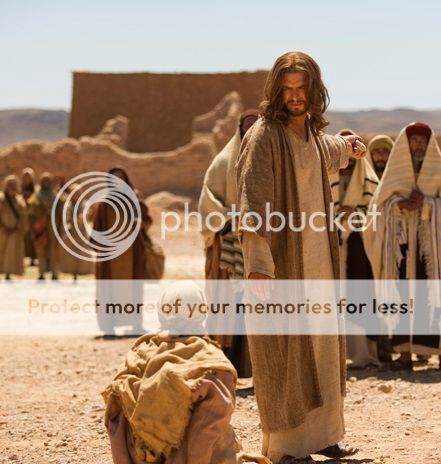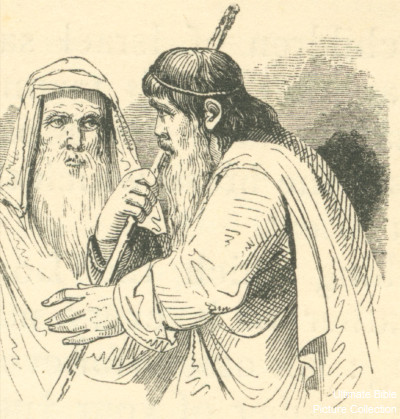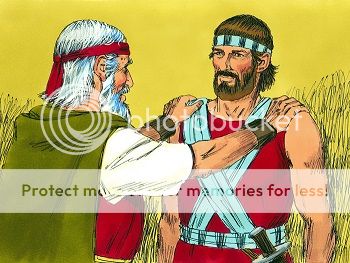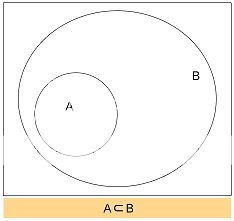Indeed, to the person of faith, for almost every case of contradiction, there seems to be a profound explanation that resides deep in the enigma. As such, we can't just lose hope, because something nags us, whispering to us that the answer really is dug deep within the passage.
I have not come to abolish the law and the prophets, but to fulfill them
Today I will discuss the enigma regarding Jesus' grand affirmation in Matthew 5:17, which says "I have not come to abolish the law and the prophets, but to fulfill them."
Oftentimes when reading scripture, a believer may give Christ the benefit of the doubt regarding his treatment of the law, justifying that the old has gone and the new has come. But that doesn't explain how Jesus fulfilled the old law. This is what I would call giving Jesus a free pass. To any honest thinker, this will never satisfy reason.
However, I believe I've found the answer shortly after watching the Son of God film which recently released in theaters.
In the scene in John 8:1-11 where Jesus is confronted with an adulteress, something happens. Instead of obeying the article of law in Deuteronomy 22:20-21, which states that:
"20 If, however, the charge is true and no proof of the young woman’s virginity can be found, 21 she shall be brought to the door of her father’s house and there the men of her town shall stone her to death. She has done an outrageous thing in Israel by being promiscuous while still in her father’s house. You must purge the evil from among you."Jesus chooses grace. Why is that decision not a violation of the law?
Judges
To find our answer, we need return to the time of judges, where the enforcement of the law first began. Originally, in the time of Moses, the law was made to maintain order in the promised land, enforced under the governance of judges so as to ensure that the perfect justice of God was satisfied within the people of Israel.
We should remember that the very first judge was Moses, under Jethro's guidance, and that Moses was later succeeded by Joshua as judge over Israel.
The stories of the judges of Israel are recorded in the book of Judges, hence its name. As you may have suspected, the leading attribute of a judge is wisdom. Why so? Because a judge was meant first and foremost to decide and settle cases of violation of the law, who is in the right, and who is in the wrong. We get this insight on the role of judges in Exodus 18:13-16, in a portion of a passage entitled "Jethro's advice to Moses".
13 The next day Moses took his seat to serve as judge for the people, and they stood around him from morning till evening. 14 When his father-in-law saw all that Moses was doing for the people, he said, “What is this you are doing for the people? Why do you alone sit as judge, while all these people stand around you from morning till evening?” 15 Moses answered him, “Because the people come to me to seek God’s will. 16 Whenever they have a dispute, it is brought to me, and I decide between the parties and inform them of God’s decrees and instructions.”Such a task requires wisdom, which we know from the story of Solomon and the two mothers in 1 Kings 3:16-28.
16 Then two women who were harlots came to the king and stood before him. 17 The one woman said, “Oh, my lord, this woman and I live in the same house; and I gave birth to a child while she was in the house. 18 It happened on the third day after I gave birth, that this woman also gave birth to a child, and we were together. There was no stranger with us in the house, only the two of us in the house. 19 This woman’s son died in the night, because she lay on it. 20 So she arose in the middle of the night and took my son from beside me while your maidservant slept, and laid him in her bosom, and laid her dead son in my bosom. 21 When I rose in the morning to nurse my son, behold, he was dead; but when I looked at him carefully in the morning, behold, he was not my son, whom I had borne.” 22 Then the other woman said, “No! For the living one is my son, and the dead one is your son.” But the first woman said, “No! For the dead one is your son, and the living one is my son.” Thus they spoke before the king. 23 Then the king said, “The one says, ‘This is my son who is living, and your son is the dead one’; and the other says, ‘No! For your son is the dead one, and my son is the living one.’” 24 The king said, “Get me a sword.” So they brought a sword before the king. 25 The king said, “Divide the living child in two, and give half to the one and half to the other.” 26 Then the woman whose child was the living one spoke to the king, for she was deeply stirred over her son and said, “Oh, my lord, give her the living child, and by no means kill him.” But the other said, “He shall be neither mine nor yours; divide him!” 27 Then the king said, “Give the first woman the living child, and by no means kill him. She is his mother.” 28 When all Israel heard of the judgment which the king had handed down, they feared the king, for they saw that the wisdom of God was in him to administer justice.Thus, when Jesus is presented a woman caught in adultery, he is in essence being asked to settle a matter as a judge. If Jesus is the Sage of sages as explained in Matthew 12:42
"42 The queen of the south shall rise up in the judgment with this generation, and shall condemn it: for she came from the uttermost parts of the earth to hear the wisdom of Solomon; and, behold, a greater than Solomon is here."then he certainly is the Judge of judges.
This critical moment, as Jesus judges the case of adultery, begs the question: is Yeshua's responsibility as a judge to evaluate whether this woman has violated the article on adultery in Deuteronomy, or to judge her according to the whole of the law, in its totality? Well, the answer is both.
In truth, as a judge, Jesus must evaluate each and every article of the law, according to the perfection of the law and the justice of the Almighty. Thus, it's true that Jesus must evaluate how this woman fares before the article of adultery, on which account she is guilty, hence his command for her to "go and sin no more". Now, having said that, Jesus must also judge her against all other articles of the law, especially those of greater importance.
When presented only with the law's article on adultery, a poor judge would ask that the woman be stoned.
The archetype for a poor judge is the Pharisee. Accordingly, Jesus judged the Pharisees in Matthew 23:23-24, saying:
23 “Woe to you, teachers of the law and Pharisees, you hypocrites! You give a tenth of your spices—mint, dill and cumin. But you have neglected the more important matters of the law—justice, mercy and faithfulness. You should have practiced the latter, without neglecting the former. 24 You blind guides! You strain out a gnat but swallow a camel.Forgiveness in the Prophets, and the Law
To answer the second question, must Jesus, the Judge of judges, evaluate the case of the adulteress according to the totality of the law, especially according to possible aspects of greater importance? Certainly yes.
The prophets add another article to be considered in the judgement, which states:
"No more shall every man teach his neighbor, and every man his brother, saying, `Know the Lord,' for they all shall know Me, from the least of them to the greatest of them," says the Lord. "For I will forgive their iniquity, and their sin I will remember no more." (Jer 31:34)Furthermore, within the law itself, the second greatest commandment was taught by rabbi and Judge of judges Yeshua, recorded in Matthew 22:36-40:
36 “Teacher, which is the greatest commandment in the Law?” 37 Jesus replied: “‘Love the Lord your God with all your heart and with all your soul and with all your mind.’ 38 This is the first and greatest commandment. 39 And the second is like it: ‘Love your neighbor as yourself.’ 40 All the Law and the Prophets hang on these two commandments.” (references to Deuteronomy 6:5 and Leviticus 19:18 added)Therefore, Jesus reveals that the law itself follows an order of priorities, one law taking precedence over another, one weighing more than the other.
In the spirit of love, therefore, the forgiveness of God is an article of law that cannot be ignored, and certainly takes precedence over the cold and shallow justice as offered by isolating the article of law on adultery. Ultimately, Christ's answer is that grace triumphs over imperfect justice, and that perfect justice, in contrast, demands grace. In other words, per God's perfect justice, grace is a prioritary requirement. And that is why Christ did not override the law. Instead, he made sure that the law was actually followed as it was intended to.
Only God could enforce the law as it was intended to be put into practice. For us it is a miracle, but for him it is natural. After all, he wrote the law, and the whole world governed by it.
To drive the idea home, let's look back at the original passage of Deuteronomy 22:20-21:
"20 If, however, the charge is true and no proof of the young woman’s virginity can be found, 21 she shall be brought to the door of her father’s house and there the men of her town shall stone her to death. She has done an outrageous thing in Israel by being promiscuous while still in her father’s house. You must purge the evil from among you."This sad situation must be looked at from the root, the last phrase of the passage: "You must purge the evil from among you." The idea behind all this nastiness is that morality is seen as a cosmic battle between good and evil. To fight immorality is to fight evil itself. From that point of view, what is one life on earth compared to eternity?
"[W]hat will it profit a man if he gains the whole world and forfeits his soul? Or what shall a man give in return for his soul?" (Matthew 16:26)Yet at the same time, killing a person, even as a judge, as a punishment for something immoral done, looks like a perpetuation of evil and sin, akin to murder. Would it not be therefore going backwards in the cosmic battle against sin?
It now really explains from a deep level why Christ's involvement introduces the answer to the issue. If the ultimate goal is to purge the evil from among us, and we are in a cosmic battle over sin, and punishing humans for their immorality is going against the overall goal, then since Jesus leads people to repentance, without enforcing punishment, he has satisfied all laws in one shot.
"Go, and sin no more".
(Copyrights disclaimer: This article is not for profit, share at will. The images used are property of their respective owners, I claim no rights of ownership on the images.)











